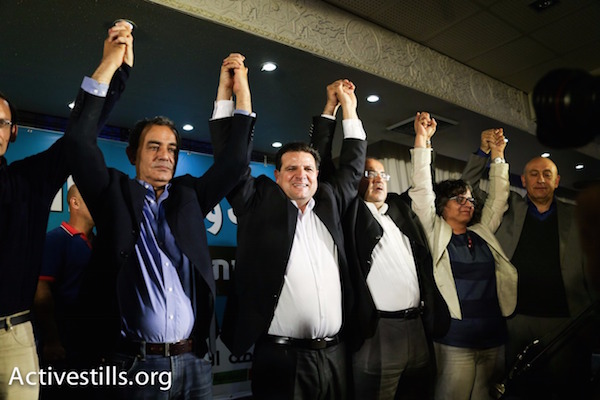These elections showed that Israelis are guided by their fears of another Holocaust, ISIS, Arab citizens or left-wing NGOs. Now is the time for it to move beyond the scars of the past and make real change, before it is too late.
It’s all because of the Holocaust. Yes, these elections revealed the depth of the scar that still affects most Jews in Israel. Netanyahu turned out to be the good “shepherd” of the nation, who is well aware of the kind of herd he has been raising for the past 20 years. This is a frightened and discipline herd, which passes on the feeling of persecution and worldwide hatred of Jews from generation to generation.
This is a herd that is frightened of foreigners, and allows itself to do anything in the name of sacred survival and security: occupation, murder, arrests, home demolitions, control of people and land — everything is kosher. Even when members of the herd live in fancy, protected settlements, and even after building fences and walls with security cameras on every corner, they remain the same Holocaust survivors, victims of the great expulsion to Babylon, and they carry this with them their entire lives. The herd is controlled by the same establishment that forcefully perpetuates and exacerbates the story of a persecuted people: the people who established a tiny state in the Middle East, because God gave them the right to do so, and are only looking to live in peace and quiet.
This past election cycle only deepened the belief, which perhaps I was in denial of, that this complex may be unsolvable. I thought that all those who made fun of Netanyahu and his cartoon drawing of Iran’s nuclear weapon had already recovered, and who wanted to rid themselves of the feeling that “the entire world is against us,” or “everyone is anti-Semitic.” Turns out I was wrong.
On the contrary. The extreme right wing was able to improve and enhance the level of sensitivity of this complex, such that it would include the Islamic State, Hamas, Arab citizens, left-wing NGOs and more. The prime minister didn’t shy away from pressing all of these buttons, giving speech after speech on the Arabs coming in droves, armed with their ballots, ready to conquer the voting booths. We must fight to protect our homeland from them, he said, and it worked.
I was shocked that journalists didn’t lift a finger and attack Netanyahu’s statements, whether in the name of Israel’s vaunted democracy, not to mention a modicum of decency. I imagined Angela Merkel speaking in front of the German people on election day: “The Jews are voting,” she would shout, “And you, the great German nation, are sitting at home?” What would happen in the world or the Israeli media? Netanyahu himself would have headed a solidarity delegation to the Jews of Berlin, and surely would have given a heated speech about the rise of racism, the Holocaust and anti-Semitism, as he did not long ago in France. But why should we condemn Netanyahu, when his own foreign minister suggested chopping off the heads of his opponents with an ax.
These elections were of great interest to many learned sociologists, who spoke about the different groups in Israeli society, about demography and different sectors. And all the while, what we really needed were psychologists who specialize in phobias, paranoia, self-hatred and hatred of the other, not to mention post-post-post trauma.

I tried to understand why this nation has chosen its least successful leader to lead it once more. I have no explanation aside from this “scar” or fear of change. This is comparable to a child who wets himself at night, and instead of being weaned, he simply learns, with the help of the best psychologists, to live with it. “Warm and nice,” he tells himself, “nasty but familiar.” Nothing will change until the child discovers that he smells so bad that people stay away from him. Until then, there will be no change. Perhaps things need to become really bad before someone wakes up.
This election, the sane Arabs and Jews tried to be the alarm clock for Israeli society. They succeeded in fixing the clock, adjusting it and warning about the situation before it was too late. With 13-14 seats, they succeeded in sounding the alarm too softly, before it was immediately silenced. But with the establishment of the Joint List, the level of hostility and racism jumped a level under Netanyahu. The Arabs in the List have developed a special immunity and steadfastness to this type of racism. A new layer of skin, which as grown over the years as a response to the continual discrimination against them.
Yes, we had very little expectations for a significant political upheaval. But I feel sorry for my Jewish friends — I even found myself consoling some of them, telling them that everything is for the better. I told one of them that perhaps if this upcoming term brings about even more extremism and violence, unrest in the Gaza Strip and the West Bank, international isolation and privatization, then perhaps it will bring about a new consciousness to the Israeli public. Maybe this time will make clear that the child stinks, and it is time to be weaned.
Until that happens, we’ll flee the country to breathe the fresh air in another country. We’ll compare prices, complain a bit, dream a bit about a better future. And we’ll return, of course we’ll return. We always return.
Samah Salaime is a social worker, a director of AWC (Arab Women in the Center) in Lod/Lyd and a graduate of the Mandel Leadership Institute in Jerusalem. This article was first published on +972′s Hebrew-language sister site, Local Call. Read it in Hebrew here.



